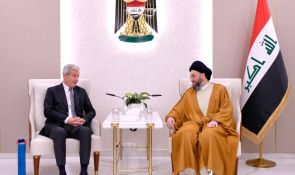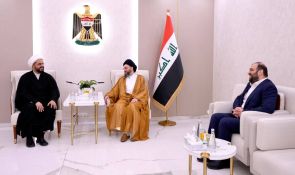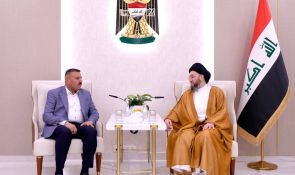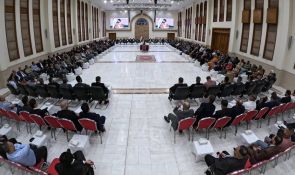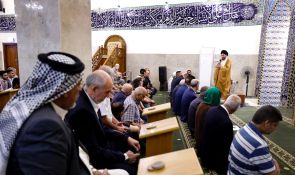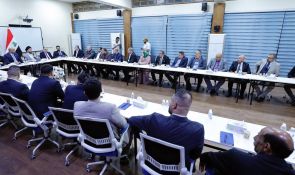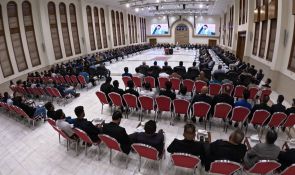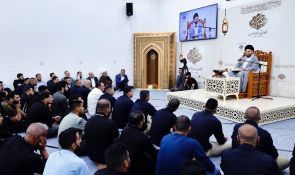Sayyid Ammar Al Hakim Warns Against Serious Repercussions if the Displaced Families Don’t Return to Their Regions
Sayyid Ammar Al Hakim, head of the Islamic Supreme Council of Iraq, warned against serious repercussions if the displaced families don’t return to the regions they fled because of ISIS, highlighting the importance of withstanding all attempts of demographic change in Iraq. His eminence insisted that the displaced should be returned to their houses and cities according to criteria that prevent the predominance of ISIS again, stressing the need to define a ceiling for the national reconciliation process mainly represented by the constitution and the political process and to introduce the amendment as per the constitutional frameworks. His eminence clarified that the meetings of leaders can in fact mitigate the problems but they don’t solve them, hence the need for a national reconciliation, based on a comprehensive strategic vision that reassures everyone and distribute the roles. Therefore, he called to identify the reconciliation parties and guarantees, which means that those opposing the reconciliation should be able to calm down. He underlined in this context that reconciliation does not include ISIS and anyone whose hands were stained with the blood of Iraqis.
This came in a speech delivered by his Eminence in the mayoralty of Baghdad in the presence of Iraqi political elites, at his office on Saturday, 14/3/2015.
Sayyid Al Hakim compared the terrorist organizations in Iraq in terms of Iraqi participation, starting with Al Qaeda and Al Tawhid wal Jihad headed by Al Zarkawi, passing by the Islamic State headed by Abu Omar Al Baghdadi, to ISIS headed by Abu Bakr Al Baghdadi. His eminence explained that solutions are not only at the security level, although necessary, but there must be one-basket solutions like economic, social and political solutions. He called therefore to remember the comprehensive solutions and not to think that the issue is over when military victory is achieved, as there is a need to oppose school curricula that call for killing and terrorism. His eminence urged everyone to support and listen to the moderate voice, reminding of the recurring authority’s affirmations of the need for the citizens of usurped provinces to have a role in freeing them, so that they can feel triumph over ISIS. Furthermore, his eminence lauded the high discipline manifested by the army, the police, the popular crowd and the Iraqi tribes and the participation of tribe leaders even in operations rooms. He indicated that the progress of Iraqi forces is extirpating ISIS on one hand and strengthening the tribes and citizens on the other hand.
The head of the Islamic Supreme Council of Iraq highlighted the role of the tribes in restoring national cohesion and the need to follow the psychological repercussions of ISIS attacks on the martyrs’ families, the orphans and the widows. He also stated that political reform is imperative, be it from top to bottom or from bottom to top, stressing Iraq’s need for a study center focused on the post-ISIS phase. His eminence pointed out that corrupters and extremists are the ones who cause terrorism, and he considered that the biggest and only victory is to reach a unified Iraq and to build all relations on the basis of Iraq’s interest.
His eminence finally called to enact the law relative to the National Guard within the national context, explaining that the popular crowd, of all affiliations, is heading towards more organization, and it possesses an ideology and front-row leaders. He praised in the end the high morale of the wounded members of the security forces and the popular crowd.


